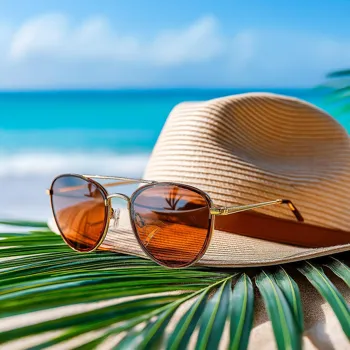10 Tips for Staying Healthy While Traveling: Your Ultimate Guide. Discover how to prioritize health on your adventures!
Traveling is a fantastic opportunity to explore new places, meet new people, and create
lasting memories. However, it can also disrupt your regular routine and expose you to new germs and challenges that can take a toll on your health.

Whether you are planning a short weekend getaway or an extended overseas trip, it is important to prioritize your health and well-being. From staying hydrated to managing stress, these tips will help you enjoy your travels while feeling your best.
Plan Ahead and Pack Smart:Before you even set foot outside your door, a little bit of planning can go a long way in safeguarding your health. Start by researching your destination. Are there any specific health risks to be aware of, such as mosquito-borne illnesses or water quality concerns? Check with your doctor to see if you need any vaccinations or medications for your trip. Make sure you have a well-stocked first-aid kit that includes essentials like bandages, antiseptic wipes, pain relievers, and any personal medications you take regularly. It is also a good idea to pack healthy snacks like nuts, seeds, and dried fruits to avoid unhealthy food choices when you are on the go. Consider packing a reusable water bottle, travel-sized hand sanitizer, and wet wipes to maintain hygiene. With meticulous planning and thoughtful packing, you are essentially building a strong foundation for a healthy and happy travel experience.
Stay Hydrated:
Staying well-hydrated is super important when you're travelling. Whether you're flying in the air, trekking up mountains or just wandering around a new city, your body loses fluids.
Not drinking enough water can lead to tiredness, give you headaches, and make it harder to think clearly. Always carry a refillable water bottle with you and make it a point to fill it up whenever you get the chance, this could be at the airport, your hotel, or a restaurant.
Avoid sugary drinks such as sodas and juices, as they can actually dehydrate you. If you are doing a lot of physical activity, think of adding electrolytes to your water to replace the minerals you lose when you sweat.
If you keep yourself hydrated, you will keep yourself alert, energetic, and ready to enjoy all the sights and sounds of your trip.
Eat Healthy:
Maintaining healthy eating habits while traveling can be difficult, but it is important for maintaining your energy levels and immune system. Seek out local markets to sample fresh fruits, vegetables, and other local specialties.
When eating out, opt for grilled, baked, or steamed options rather than fried foods. Be mindful of portion sizes, and avoid overeating, even when faced with tempting dishes. Pack healthy snacks like nuts, seeds, and fruit to avoid unhealthy impulse buys when you are hungry.
Be cautious about street food, and make sure that the food stall is clean and that the food is cooked properly because hygiene standards might vary. If you have dietary restrictions or allergies, research restaurants in advance to ensure that you have options.
Preparing some of your own meals, if possible, can give you greater control over your ingredients.
Prioritize Sleep:
Travel can be tiring, and it can disrupt your sleep patterns. Sleep is essential for maintaining both physical and mental health. Try to stick to a regular sleep schedule as much as possible. Create a relaxing bedtime routine. Make sure your sleeping environment is dark, quiet, and cool.

Use earplugs or an eye mask if necessary. Avoid caffeine and alcohol before bed. If you are crossing time zones, try to adjust to the new time zone as soon as possible. If you have trouble sleeping, consider bringing a sleep mask or earplugs with you.
Adequate sleep will help you feel refreshed, energized, and ready to take on the day.
Be Mindful of Hygiene:
Maintaining proper hygiene is crucial, especially when traveling to unfamiliar environments where you may be exposed to new germs and viruses. Wash your hands frequently with soap and water, especially before eating and after using the restroom.
If soap and water aren't available, carry hand sanitizer and use it regularly. Avoid touching your face, especially your eyes, nose, and mouth. Be cautious about touching surfaces in public places, such as doorknobs, handrails, and elevator buttons.
Carry wet wipes to clean surfaces and personal items. Wear clean clothes every day, and wash them regularly. Avoid sharing personal items.
Stay Active:
Even when you are traveling, it is important to stay active. Regular physical activity helps to keep you motivated, improves your overall health, and reduces stress. Look for opportunities to walk, hike, or bike wherever you are visiting. Many hotels have gyms or swimming pools that you can use.

Take the stairs instead of the elevator whenever possible. Even a short walk can make a big difference in the way you feel. Consider bringing a jump rope or resistance bands with you for quick workouts in your hotel room. Staying active will keep you energetic and boost your mood.
Manage Stress:
Travel can be stressful, especially when there are delays, cancellations, or unexpected problems. Stress can weaken your immune system and make you more susceptible to illness. Find healthy ways to manage stress, such as relaxation techniques, meditation, or yoga.

Make time for activities that you enjoy, whether it is reading, listening to music, or spending time in nature. Talk to someone about your concerns, if needed. Plan your trip carefully, but be flexible enough to adapt when things don't go according to plan.
Protect Yourself from the Sun:
Sun exposure can be stronger when you are traveling, especially in sunny locations. Protect yourself from the sun by wearing sunscreen with an SPF of 30 or higher, even on cloudy days. Wear a wide-brimmed hat and sunglasses to protect your face and eyes.

Avoid being in the sun during the hottest part of the day, which is usually between 10 a.m. and 4 p.m. Stay in the shade when possible. The sun is really strong and can damage your skin.
Be Aware of Local Health Risks:
Before you travel, research the health risks specific to your destination. Some countries may have higher rates of infectious diseases, such as malaria, dengue fever, or Zika virus. Talk to your doctor about any vaccinations or medications you may need.

Be aware of the risks of contaminated food or water. Be cautious about swimming in natural bodies of water, which may be polluted. Avoid contact with wild animals. In case of medical emergency, know where the nearest hospitals, etc
Get Travel Insurance:
Travel insurance can protect you from unexpected medical expenses, trip cancellations, and lost luggage. Look for a policy that covers medical emergencies, including hospitalization, surgery, and evacuation.
The insurance should cover your flight in case of cancellation due to inclement weather or medical reasons. Compare different policies and choose the one that best meets your needs. Read the fine print carefully to understand what is covered and what is not.
Always carry a copy of your insurance policy with you, along with the insurance company's contact information.
Healthy travel habits promote overall well-being
If people maintain these habits while travelling, they can stay healthy.














